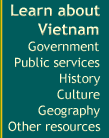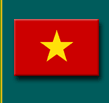











|
Government
The Government
Prime Minister Phan Van Khai
First Deputy Prime Minister Nguyen Tan Dung
Deputy Prime Ministers Nguyen Manh Cam, Nguyen Cong Tan, and Pham Gia
Khiem
Governmental office address: 1 Hoang Hoa Tham Str., Hanoi.
The Government is the executive organ of the National
Assembly, the highest organ of state
administration of the Socialist Republic of Vietnam. It shall carry out
overall management of the
work for the fulfillment of the political, economic, cultural, social ,
national - defense, security and
external duties of the State.
The Government shall ensure the effectiveness of the State apparatus
from the center to the
grassroots , ensure the respect for and implementation of the Constitution
and the law; it shall
promote the mastery of the people in national construction and
defense,ensure security and
improvement of the people's material and cultural living conditions.The
Government is accountable
to the National Assembly and shall made its reports to the National
Assembly, its Standing
Committee, and the country's President.
The Government shall be composed of the Prime Minister, the Deputy
Prime Ministers,the Cabinet
Ministers, and other members. With the exception of the Prime Minister,
its members are not
necessarily members of the National Assembly.
The Duties and Powers of the Government
- * To direct the work of the ministries,the organs of ministerial rank
and the organs of the
Government, the People's Committees at all levels; to build and
consolidate the unified
system of the apparatus of State administration from the center to the
grassroots; to guide &
control the People's Councils in their implementation of the directives of
superior organs of
State administration; to create favorable conditions for the people's
Councils to fulfill their
duties& exercise their powers as laid down by law; to train, foster,
dispose and use State
officials and employees;
- * To ensure the implementation of the Constitution & the law in
State organs, economic
bodies, social organizations, units of the armed forced, and among the
citizens; to organize &
direct propaganda and educational work among the people concerning the
constitution and
the law;
- * To present draft laws, decree-laws and other projects to the
National
Assembly and its
Standing Committee;
- * To ensure the overall management of the building and development of
the national economy;
to carry into effect national financial and monetary policies; to manage
and ensure the
effective use of property in the ownership of the entire people; to
promote the development
of culture, education, healthcare, science and technology; to carry out
the plan for
socio-economic development & to give effect to the State
budget;
- * To take measure to project the rights and legitimate interests of
the
citizen, to create
conditions for him to exercise his right and fulfill his duties, to
protect the property and
interests of the state and society; to protect the environment;
- * To consolidate and strengthen national defense by the entire people
and the people's
security; to ensure national security and social order; to build the
people's armed forces; to
carry into effect general mobilization, to proclaim the state of emergency
and all other
necessary measures to defend the country.
- * To organize and direct the conduct of State inventories and
statistics; State inspection and
control; to fight bureaucratism and corruption in the State machinery; to
settle complaints and
denunciations by citizens.
- * To ensure the overall management of the State's external relations;
to
sign, join, approve
international agreements on behalf of the Gover. to direct the
implementation of international
agreements subscribed to or joined by the Socialist Republic of Vietnam;
to protect the
interests of the State and the legitimate interests of Vietnamese citizens
and organizations in
foreign countries.
- * To implement social policies, nationalities policies, policies on
religion.
- * To take decisions on the adjustment of the boundaries of
administrative units below the level
of the province and the city under direct central control.
- * To coordinate its efforts with those of the Vietnam fatherland front
and all mass organizations
in the fulfillment of their duties and exercise of their rights;to create
conditions for their
effective functioning.
The Prime Minister is accountable to the National Assembly
and shall make his reports to the
National Assembly, its Standing Committee, and the country's
President.
The Deputy Prime Ministers shall assist the Prime Minister in the
Performance of his duties, as
required by him. In the absence of the Prime Minister, one of his Deputies
shall be delegated by
him to direct the work of the Government.
The Duties and Powers of the Prime
Minister
- * To direct the work of the Government, the Government members, the
People's Councils at
all levels; to chair Cabinet meetings.
- * To propose to the National assembly to set up or disband ministries
and organs of ministerial
rank; to present to the National Assembly or, when the latter is not in
session, to its Standing
Committee, for approval, proposals on the appointment, release from duty,
or dismissal of
Deputy Prime Ministers,Cabinet Ministers and other members of the
government.
- * To appoint, release from duty, or dismiss Vice-Ministers and
officials
of equal rank; approve
the election, release from duty, secondment, and dismissal of Chairmen and
Deputy
Chairmen of People's Committees of provinces and cities under direct
central rule.
- * To suspend or annul decisions, directives and circular of Cabinet
Ministers and other
Government members, decisions and directives of People's Councils and
Chairmen of
People's Committees of provinces and cities under direct central rule that
contravene the
Constitution, the law, and other formal written documents of superior
State organs.
- * To suspend the execution of resolutions of People's Councils of
provinces and cities under
direct central rule that contravene the Constitution, the law, and formal
written orders of
superior State organs; at the same time to propose to the Standing
Committee of the
National Assembly to annul them.
- *To make regular reports to the people through the mass media on major
issues to be settled
by the Government.
On the basis of the Constitution, the law, and the resolutions of the
National Assembly, the
decree-laws and resolutions of the latter's Standing Committee, the orders
and decisions of the
country's President, the Government shall issue resolutions and decrees,
the Prime Minister shall
issue decisions and directives and shall supervise the execution of those
formal written orders.
Learn about Vietnam
Government |
Public services |
History |
Culture |
Geography |
Other resources
|
|











